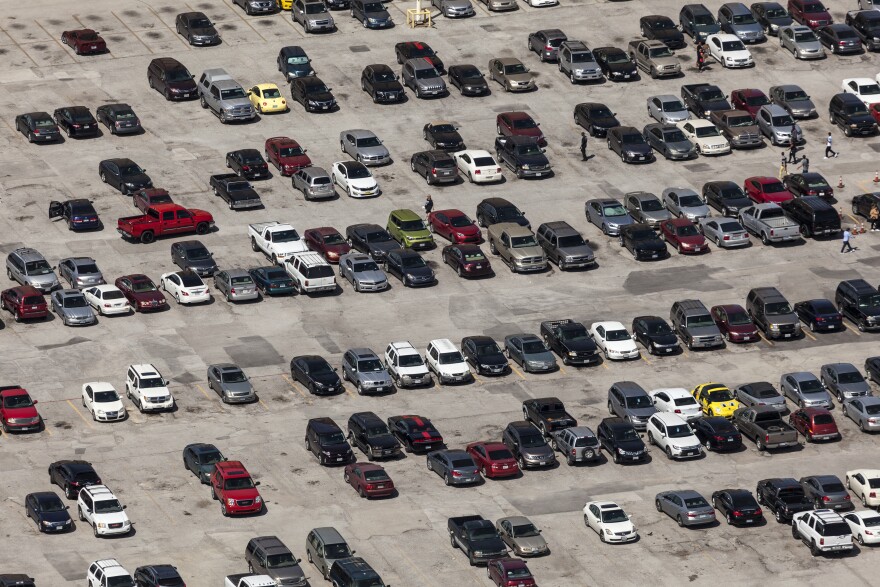The city of Dallas has approved a major reform to its parking ordinance after six years of planning and debate.
The new city policy eliminates most parking minimums, which advocates hope will support economic development, create more walkable neighborhoods and spur more housing.
“It represents a reversal of decades of policy that prioritized parking cars over building community,” Adam Lamont, a Dallas resident and member of the advocacy group Dallas Neighbors 4 Housing, told council members during a public hearing Wednesday. “And like a ship, this reversal will be slow, taking years and even decades to really take effect.”
The new policy gets rid of parking minimums for areas located around light rail and streetcar stations, downtown and office and retail areas, with some exceptions. It eliminates parking requirements in industrial and commercial service areas of Dallas — except when located near single-family homes.
The change also reduces requirements for bars, restaurants and other amusement uses to one space per 200 square feet. Bars and restaurants in buildings under 2,500 square feet won’t have parking minimums.
In a news release announcing the change, the city said the reform provides "a more flexible context-sensitive framework for off-street parking in Dallas."
"This marks a first and major milestone in a broader effort to reform and align the City of Dallas' zoning code with the evolving needs of our city and with adopted city policies," Dallas City Manager Kimberly Bizor Tolbert said in a statement.
The U.S. Department of Transportation has pointed to parking reform as a way for cities to meet climate goals by reducing reliance on cars and eliminating emissions, and curbing the “heat island” effect in areas with a lot of concrete.
“Parking reforms can reduce the amount of space needed for parking, contributing to more dense developments which can help preserve open green space to mitigate flooding or heat impacts,” one reform study said.
Proponents of the change told Dallas city leaders it will also be an economic boost.
Russell Tibbitts, a cafe owner in Oak Cliff, said his business was forced to pay for a parking spot to meet the old requirement. He said the reform allows businesses like his to “focus not on securing parking spaces that won’t be used, but on building better businesses that provide more for the community and ultimately more tax revenue for the city.”
Not all residents support parking reform. Laura Palmer, who also lives in Oak Cliff, said if developments don’t provide enough parking, “people will find a place to park.”
“They will park on sidewalks. They will park on empty lots,” she said. “They will find the place to park, even if you don't require it. That puts the burden on us as neighbors.”
Some raised concerns that the reform is coming at a time when the state could possibly cut funding to Dallas Area Rapid Transit, putting public transit in the area at risk.
Others called the policy too “radical” for Dallas.
“No other city the size of Dallas has done this,” said resident Melanie Vanlandingham. “Where exactly will apartment residents park? How about workers who must drive to work?”
But Adam Lamont, with Dallas Neighbors 4 Housing, said while he supports the reform, it doesn’t go far enough.
“The currently recommended proposal very much is a compromise and I recognize that it is one that works for Dallas today,” he said.
The council voted 14 to 1 to approve the change, which goes into effect immediately.
Pablo Arauz Peña is KERA’s growth and infrastructure reporter. Got a tip? Email Pablo at parauzpena@kera.org.
KERA News is made possible through the generosity of our members. If you find this reporting valuable, consider making a tax-deductible gift today. Thank you.





